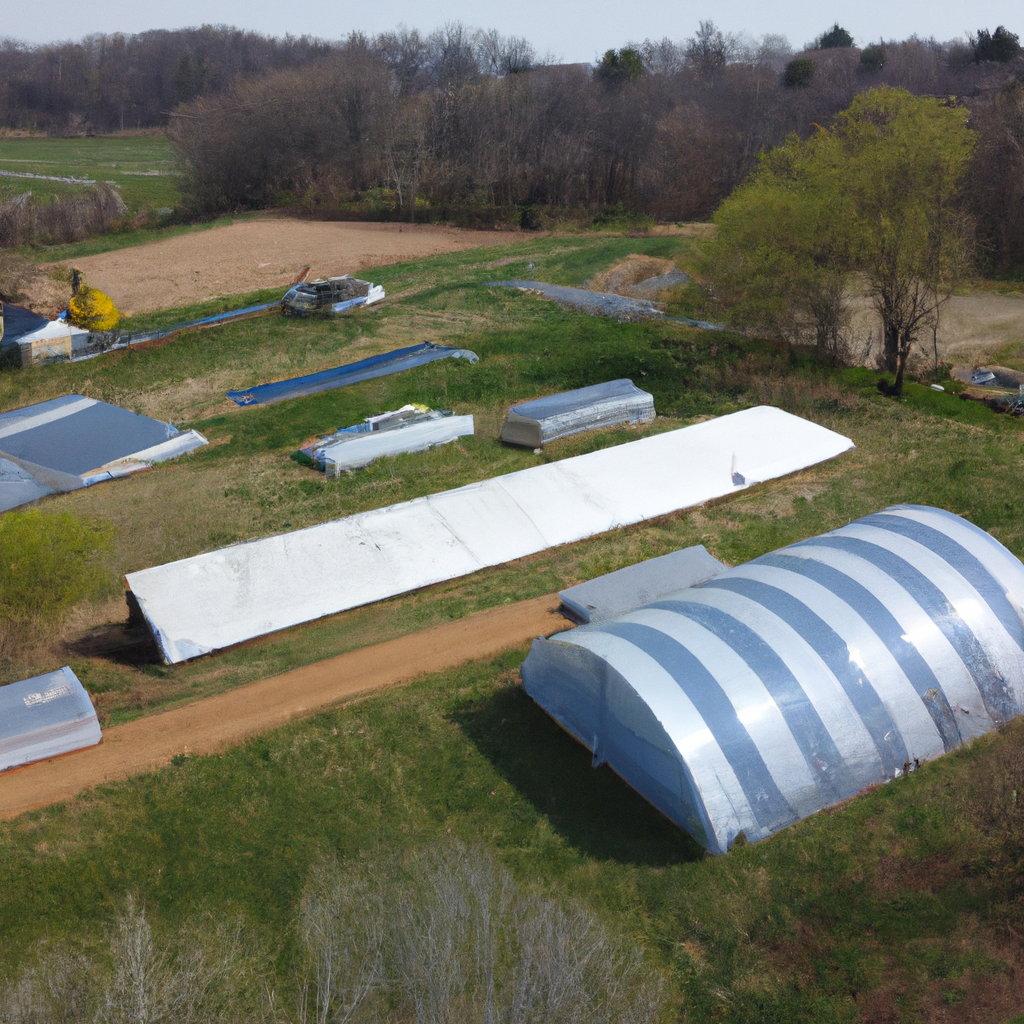
How do you create a farm-based eco-volunteer program? This blog post will answer this for you step by step. Creating a farm-based eco-volunteer program is an excellent way to promote sustainable farming practices while engaging the community in environmental conservation efforts. By combining the principles of sustainable farming with the enthusiasm and dedication of volunteers, such a program can have a significant impact on both the farm and the volunteers themselves. In this article, we will explore some key sustainable farming practices that can be incorporated into an eco-volunteer program.
Healthy soil
One of the fundamental principles of sustainable farming is soil conservation. Healthy soil is the foundation of any successful farm, and it is crucial to protect and enhance its quality. To achieve this, eco-volunteers can be involved in activities such as composting, mulching, and cover cropping. Composting involves the decomposition of organic matter, such as food scraps and plant waste, to create nutrient-rich compost that can be used to improve soil fertility. Mulching, on the other hand, involves covering the soil with a layer of organic material, such as straw or leaves, to retain moisture, suppress weeds, and prevent erosion. Cover cropping involves planting specific crops, such as legumes or grasses, during periods when the main crops are not growing, to prevent soil erosion and improve soil health.
Water Conservation
Water conservation is another critical aspect of sustainable farming. Eco-volunteers can contribute to water conservation efforts by implementing practices such as drip irrigation and rainwater harvesting. Drip irrigation involves delivering water directly to the plant roots, minimizing water wastage through evaporation or runoff. Rainwater harvesting, on the other hand, involves collecting and storing rainwater for later use, reducing the reliance on freshwater sources. By involving eco-volunteers in these activities, farms can significantly reduce their water consumption and contribute to the conservation of this precious resource.
Planting
Eco-volunteers can play a vital role in creating and maintaining habitats for beneficial insects, birds, and other wildlife. This can be achieved by planting native flowering plants, providing nesting boxes, and creating wildlife-friendly areas on the farm. By attracting and supporting natural predators, farms can reduce the reliance on chemical pesticides and promote a more balanced ecosystem.
Recyling
Sustainable farming practices also include responsible waste management. Eco-volunteers can assist in implementing recycling and composting systems on the farm, ensuring that waste is minimized and properly disposed of. Recycling involves separating and processing materials such as plastic, glass, and paper, while composting involves diverting organic waste from landfills and turning it into nutrient-rich compost. By involving eco-volunteers in these activities, farms can reduce their environmental footprint and contribute to a more sustainable future.
Consciousness
Creating a farm-based eco-volunteer program is an effective way to promote sustainable farming practices and engage the community in environmental conservation efforts. By incorporating practices such as soil conservation, water conservation, biodiversity promotion, and responsible waste management, farms can not only improve their sustainability but also provide a valuable learning experience for the volunteers. Through their participation in these activities, eco-volunteers can gain a deeper understanding of the importance of sustainable farming and become advocates for a more environmentally conscious lifestyle.
Engaging Local Communities in a Farm-Based Eco-Volunteer Program
 Engaging Local Communities in a Farm-Based Eco-Volunteer Program
Engaging Local Communities in a Farm-Based Eco-Volunteer Program
Creating a farm-based eco-volunteer program is an excellent way to engage local communities in sustainable agriculture and environmental conservation. By involving volunteers in hands-on activities on the farm, you can not only educate them about the importance of sustainable farming practices but also foster a sense of community and connection to the land. In this article, we will explore the steps involved in creating such a program and the benefits it can bring to both the farm and the local community.
First step: Your why
The first step in creating a farm-based eco-volunteer program is to define your goals and objectives. What do you hope to achieve through this program? Is it to educate the community about sustainable farming practices, promote local food production, or create a space for people to connect with nature? Clearly articulating your goals will help guide your program’s development and ensure that it aligns with your farm’s mission and values.
Second step: Define your goals
Once you have defined your goals, the next step is to identify the activities and tasks that volunteers can participate in. This could include planting and harvesting crops, tending to livestock, maintaining farm infrastructure, or even assisting with educational workshops and events. By offering a variety of tasks, you can cater to different interests and skill levels, making the program accessible to a wide range of volunteers.
Partnerships
To attract volunteers, it is essential to promote your program effectively. Utilize various channels such as social media, local newspapers, and community bulletin boards to spread the word about your farm-based eco-volunteer program. Highlight the benefits of volunteering, such as learning new skills, connecting with nature, and contributing to a sustainable community. Additionally, consider partnering with local schools, colleges, and community organizations to reach a broader audience.
Once volunteers start showing interest, it is crucial to provide them with a positive and rewarding experience. Begin by conducting an orientation session to familiarize volunteers with the farm’s operations, safety protocols, and sustainable farming practices. This will ensure that everyone is on the same page and understands their roles and responsibilities.
During the sessions
During the volunteer sessions, it is essential to provide clear instructions and guidance. Assign volunteers to tasks that match their interests and abilities, and provide them with the necessary tools and equipment. Regularly check in with volunteers to address any questions or concerns they may have and offer constructive feedback to help them improve their skills.
To foster a sense of community, consider organizing social events and gatherings for volunteers. This could include potluck dinners, farm tours, or educational workshops. These activities will not only provide an opportunity for volunteers to connect with each other but also deepen their understanding of sustainable agriculture and environmental conservation.
Show gratitude
It is crucial to recognize and appreciate the efforts of your volunteers. Expressing gratitude can be as simple as a heartfelt thank you or organizing an annual volunteer appreciation event. Recognizing their contributions will not only make volunteers feel valued but also encourage them to continue supporting your farm and its mission.
Creating a farm-based eco-volunteer program is an effective way to engage local communities in sustainable agriculture and environmental conservation. By defining your goals, identifying activities, promoting effectively, providing a positive experience, fostering a sense of community, and recognizing volunteers’ efforts, you can create a program that benefits both your farm and the local community. So, take the first step and start building connections between your farm and the people who care about the environment.
Benefits of Participating in a Farm-Based Eco-Volunteer Program

Participating in a farm-based eco-volunteer program can be a rewarding and enriching experience. Not only does it provide an opportunity to contribute to sustainable agriculture and environmental conservation, but it also offers numerous benefits for the volunteers themselves. In this article, we will explore some of the key advantages of participating in such a program.
First and foremost, a farm-based eco-volunteer program allows individuals to connect with nature in a meaningful way. Spending time on a farm, working with plants and animals, provides a unique opportunity to experience the beauty and tranquility of the natural world. This connection with nature has been shown to have numerous physical and mental health benefits, including reduced stress levels and improved overall well-being.
New skills
Furthermore, participating in a farm-based eco-volunteer program allows individuals to learn valuable skills related to sustainable agriculture and environmental stewardship. Volunteers have the opportunity to gain hands-on experience in organic farming practices, permaculture techniques, and other sustainable farming methods. These skills can be applied not only in future volunteer work but also in personal gardening or even pursuing a career in sustainable agriculture.
Spark new interests
In addition to acquiring practical skills, participating in a farm-based eco-volunteer program also offers the chance to learn about the importance of sustainable food systems and the environmental impact of our food choices. Volunteers often have the opportunity to engage in discussions and workshops on topics such as food waste, local food production, and the benefits of organic farming. This knowledge can empower individuals to make more informed and sustainable choices in their own lives, contributing to a healthier planet.
Build friendships
Another significant benefit of participating in a farm-based eco-volunteer program is the opportunity to build a sense of community and connect with like-minded individuals. Working alongside fellow volunteers who share a passion for sustainable agriculture and environmental conservation can be incredibly inspiring and motivating. The bonds formed during the program can lead to lifelong friendships and a supportive network of individuals who are committed to making a positive impact on the planet.
Moreover, participating in a farm-based eco-volunteer program can provide a unique cultural exchange experience. For off grid farming experiences read on via Off Grid Farm. Many programs offer opportunities to work with farmers from different backgrounds and learn about their traditional farming practices. This exposure to different cultures and perspectives can broaden one’s horizons and foster a greater appreciation for diversity.
Participating in a farm-based eco-volunteer program allows individuals to contribute directly to environmental conservation efforts. By volunteering on a farm that practices sustainable agriculture, volunteers are actively supporting the preservation of biodiversity, soil health, and water conservation. This hands-on contribution to environmental sustainability can be incredibly fulfilling and provide a sense of purpose and accomplishment.
Conclusion

In conclusion, participating in a farm-based eco-volunteer program offers numerous benefits for individuals. From connecting with nature and acquiring valuable skills to building a sense of community and contributing to environmental conservation, the advantages are vast. Whether you are passionate about sustainable agriculture, environmental conservation, or simply seeking a meaningful and enriching experience, a farm-based eco-volunteer program can be a transformative opportunity.
Get in touch today if you would like to showcase your programs, partner with us, or anything in between !
 Docs
Docs
 Support
Support




















 Home
Home  Whishlist
Whishlist  Cart
Cart 

















